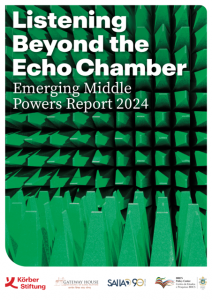
In early February CWD highlighted, and I described in the Post at Alan’s Newsletter, “Are They All Middle Powers? Or, Are There None!” this emerging Middle Power narrative:
We hoped this session would be an opportunity to examine and critique “Asia’s Future at a crossroads: A Japanese strategy for peace and sustainable prosperity.” This very valuable Report was the outcome of years of work by the ‘Asia Future’ Research Group (Research Group) co-convened by Yoshihide Soeya, Professor Emeritus of Keio University and Mike Mochizuki of the Elliott School of International Affairs of George Washington University. … The Research Group urged that Japanese policy not be reshaped by the rise in US-China rivalry and the growing geopolitical tensions in the international system generally and in the Indo-Pacific specifically. Alas, that may prove to be quite difficult.
The story of emerging Middle Powers is about to continue with a new Report, this by the Körber Foundation. As noted by Colin Bradford our lead co-chair at CWD in his invitation to CWD participants to join a coming session on March 28th:
Driven by demographic and economic factors and an increasingly self-confident presence on the world stage, emerging middle powers (such as Brazil, India and South Africa) are gaining international influence.
- What foreign policy challenges do emerging middle powers face? How do they position themselves vis-à-vis China and the war in Ukraine? And, where do they find common ground with the West, particularly on reforming the international system?
The Report is, “Listening Beyond the Echo Chamber: Emerging Middle Powers Report 2024”. This Report, front and centre in our coming CWD session, presents an intriguing survey and various findings from the following:
The first Emerging Middle Powers Survey polled nearly 1,000 politicians, diplomats, journalists, researchers and private-sector representatives from
India, Brazil and South Africa (IBSA) as well as from Germany.
The CWD gathering has the good fortune of welcoming Julia Ganter, Programme Director Körber Emerging Middle Powers Initiative to introduce the Report to CWD. In addition we have remarks from:
- Steven Gruzd, Head, African Governance and Diplomacy Programme, South African Institute for International Affairs (SAIIA), Johannesburg,
- Manjeet Kripalani, Executive Director, Gateway House Indian Council on Global Relations, Mumbai, and
- Paulo Esteves, Researcher & fmr. Director, BRICS Policy Center, Rio de Janeiro
The Report identifies the purpose of this research initiative on the part of the Korber:
The aim of our Körber Emerging Middle Powers Initiative (KEMP) is to promote dialogue between Germany and emerging middle powers, such as Brazil, India, and South Africa. With their growing political, economic and demographic weight they are key players for global problem solving and also form the G20 troika in 2024. The Russian invasion of Ukraine has shown that in Germany, among other places, geopolitical perspectives, foreign policy traditions, and national interests of emerging middle powers
are often not assessed in a realistic manner. To address this, the Körber initiative conducts an annual expert survey and facilitates various dialogue formats in cooperation with Gateway House India, the Brazilian BRICS Policy Centre and the South African Institute of International Affairs.
The initiative is valuable in part because it targets three quite important Middle Powers – India, Brazil and South Africa – all large democratic emerging market powers – that formed IBSA with the Brasilia Declaration in 2003. While overshadowed by the BRICS and now BRICS+, IBSA remains a useful gathering of key EM powers. Moreover, India, last year, Brazil this year, and South Africa in 2025 will each host the G20 Summit. With the troika mechanism these three countries will be influencing the organization and policy initiatives of the G20.
Back to the current Körber Report. The Report opens with a rather surprising conclusion in its Executive Summary:
despite differences among the four countries, there is a common basis for more meaningful engagement and joint approaches for international reform.
The survey findings are varied and interesting.The broad conclusions:
respondents in India, Brazil and South Africa (IBSA) identify a different foreign policy challenge as most important for each country – climate change for Brazil, relations with China for India, the war in Ukraine and the Middle East for South Africa – as well as international trade for all three. These are global concerns and respondents in Germany share them.
The Report is particularly interesting in highlighting differences of view between IBSA experts and German ones.
These aspects divide [Germany] them from the IBSA respondents, who perceive international trade as a foreign policy challenge, prefer to mediate between Russia and Ukraine instead of supporting either, view the dollar’s dominance unfavourably and are optimistic about BRICS+. But even in IBSA, some are critical of the group’s expansion to include the likes of Iran.
Finally, the Report brings into focus what Western interests, I suspect, need to understand and to advance more collaborative action:
Understanding the challenges of the West’s partners must begin with an examination of their specific concerns. Brazilian respondents most often cite climate change and the environment as the most challenging foreign policy issue for their country. Indian respondents see China, which their country has a ‘hot’ border with, as the biggest challenge. In South Africa, the most frequently cited issue is maintaining an autonomous foreign policy between the demands and pressures of different major powers, followed by the wars in Ukraine and the Middle East. … Taking their ideas seriously would show that the West is ready to include them as equals at the new global high table. Ultimately, this shift in thinking will transform the Western echo chamber into a symphony of voices.
The Report is very revealing and I suspect the CWD session will be lively and likely to advance our Middle Power thinking between and among the participants at the CWD.
More on that later I anticipate.

